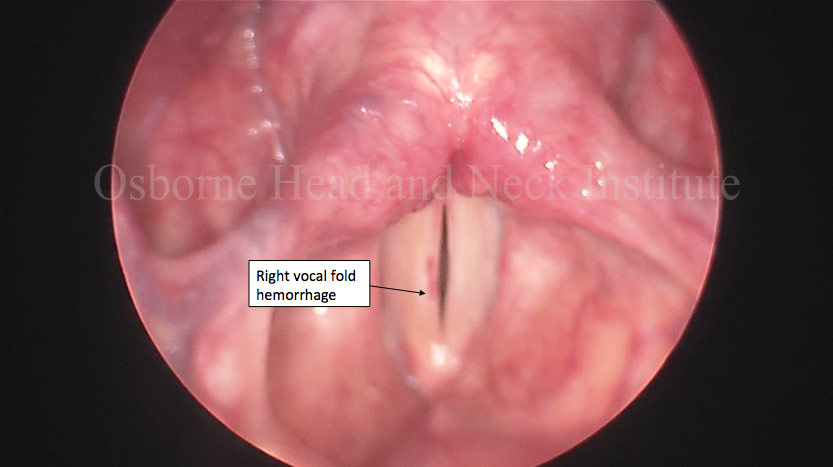- Question: How do the ingredients in e-cigarettes and vaporizers affect respiratory health? - August 16, 2019
- Bad Technique and Vocal Injury - January 9, 2019
- Is Edible Marijuana Dangerous for the Voice? Myths Dispelled - December 18, 2018
- Surprise! You have a hemorrhage - January 31, 2018
- Graves’ Disease: Treatment Overview - September 25, 2017
- Adele and the Stigma of Vocal Injury - July 11, 2017
- Vocal Curbside Consult: How does the thyroid affect the voice? - May 16, 2017
- Vocal Curbside Consult: How do hormones affect the voice? - May 3, 2017
- Vocal Curbside Consult: How do emotion and stress affect the voice? - April 17, 2017
- Vocal Curbside Consult: Vocal Recovery After Illness - April 7, 2017
Those who were in attendance when Osborne Head and Neck Institute hosted Vocal Masterclass IV at SAG-AFTRA got a little more than they bargained for during the live stroboscopy session. Indeed, even as someone who has done thousands of stroboscopy exams, include many live ones for conferences, I was taken aback when my first volunteer had a hemorrhage.
He had volunteered to be strobed because he said he had spent 6 hours the previous day in the booth recording. He said he wanted to know what such intense vocal demand would look like on the cords. It sounded interesting to me as well, although I suspected all we would see was swelling. But when the scope went in, you could hear the collective gasp in the room when a small hemorrhage was seen on the right vocal fold.

The timing of the event didn’t allow me to do the education that I could’ve done in that moment. But it was an important moment so I wanted to discuss it here. Points that should be addressed are:
1. Symptoms can be subtle – this person had voice fatigue but nothing out of the ordinary. It would be expected to be a little tired after a 6 hour recording day. This was alarming to people in the audience. How can we know if we hemorrhage? He has no symptoms and his voice sounds okay?!
This is the important part – he did have symptoms. The day before, during his session, there was one point where he felt much more tired than he had been, about 4 hours in. He pushed to finish his session. That point where he suddenly got a little more tired was probably when the hemorrhage happened. The hemorrhage therefore wasn’t totally asymptomatic – it was just a subtlety that he had to ignore due to the session he was in.
2. Resolution can be complete – it is nearly impossible for most voice users to stop in that exact moment that symptoms occur. That’s okay. If you can still get the job done, finish it. And then go on complete vocal rest and reassess in the morning. If it still feels off, you can either get checked out or, if you are able, rest one more day (complete silence). Check in the next day and if the voice symptoms persist, then get checked out.
For singers, usually the show can’t go on when a hemorrhage occurs. It will be nearly impossible to proceed without pitch issues and silence on certain notes. However, the same is true for singers. If you can do it, finish the show and then be silent. No interviews, no parties… nothing.
3. Injury happens from hemorrhages – it’s true that if voice continues during a hemorrhage, scarring or other injuries can develop. However, it would be very uncommon to have this happen in one day. Resting and getting a strobe after should result in diagnosis and complete resolution without any permanent injury when rest is implemented.
4. Treatment is possible – in addition to silence, simple measures can be implemented by your laryngologist to ensure that there is no permanent injury. This does require being seen within 1-3 days of a change in voice.
It is easy to say someone should be silent and get checked out for voice changes. The reality of it is not always practical. Between doctor and patient availability and session scheduling, it may not be feasible. My general advice is when the voice feels off, the more silence, the better. Get checked out as soon as you can. Over time, you will start to learn which voice changes really do correlate with injury and hemorrhage and which one were just swelling.
Contact a Doctor at Osborne Head & Neck Institute
If you would like to speak with one of our physicians regarding this issue or another ear, nose, throat problem; or have other questions or concerns, please complete the contact form below or call us at 310-657-0123.



